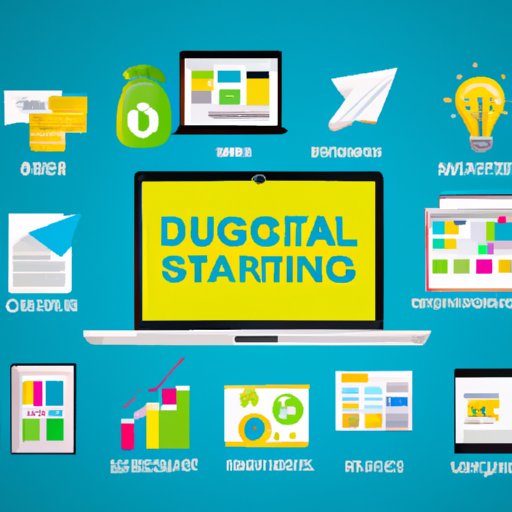Introduction
The digital revolution has changed the way we do business. As technology advances, more and more entrepreneurs are turning to digital businesses as a way to start their own venture. But what exactly is a digital business?
A digital business is any type of business that operates primarily online. This includes selling products or services, providing information, or offering advice. Digital businesses have the potential to reach a global audience and generate significant profits. The best part is that they can be started with minimal upfront costs and without the need for physical premises.
Starting a digital business has many advantages. It allows you to work remotely, reach a larger customer base, and reduce overhead costs. Plus, it opens up opportunities to make money in new and exciting ways.
Research the Digital Business Landscape
Before launching your digital business, it’s important to research the digital business landscape. There are a variety of different types of digital businesses that you can explore, each with its own set of challenges and opportunities.
For example, you could start an e-commerce store, where customers can purchase products directly from you. You could also offer digital services such as website design, SEO, content creation, or social media management. Or you could create an informational website or blog, which provides users with valuable resources and information.
It’s important to understand the challenges associated with each type of digital business. For example, running an e-commerce store requires a lot of time and effort to manage inventory, process orders, and ship items. And running a digital service business involves finding clients, understanding their needs, and delivering quality work.
Identify Your Niche
Once you’ve identified the type of digital business you want to start, the next step is to identify your niche. This involves understanding who your target audience is and the services you can provide them.
If you’re starting an e-commerce store, for example, you need to determine who your customers are and what products they’re looking for. If you’re offering digital services, you need to understand the needs of your potential clients and how you can help them achieve their goals.
It’s also important to consider the competition in your niche. What makes your business unique and why should customers choose you over other businesses? By researching the market and understanding the needs of your target audience, you can develop a strategy to stand out from the competition.
Develop a Business Plan
Once you’ve identified your niche, the next step is to develop a business plan. This involves setting goals and objectives and creating strategies to achieve them. It also involves identifying the resources and tools needed to implement your plan.
Your business plan should include a timeline for launching and growing your business, as well as strategies for marketing and customer service. It should also include a financial plan that outlines your expected expenses and potential profits.
By developing a comprehensive business plan, you can ensure that your business is on track for success. It will also serve as a reference point when making decisions moving forward.
Establish a Budget
Setting a budget is an essential step in starting a digital business. This involves assessing your expected expenses and determining how much you can afford to spend. It’s important to consider both one-time costs, such as website design, and recurring costs, such as hosting fees.
You should also consider potential profits. How much do you expect to make from your business? Do you have a plan for reinvesting profits back into the business? By understanding the potential profits and expenses associated with your business, you can create a sustainable budget.
Build Your Online Presence
Once you’ve established a budget, the next step is to build your online presence. This involves creating a website and optimizing it for search engines. It also involves leveraging social media to reach a wider audience.
When designing your website, focus on creating an intuitive user experience. Make sure the navigation is easy to use and the content is engaging. You should also focus on SEO, which involves optimizing your website for relevant keywords and phrases.
Finally, don’t forget about social media. Platforms like Facebook, Twitter, and Instagram are great ways to connect with potential customers and spread awareness of your business. Just make sure to post regularly and engage with your followers to keep them coming back.
Conclusion
Starting a digital business can be a rewarding and lucrative endeavor. With the right knowledge and resources, you can create a successful venture that generates significant profits. To get started, research the digital business landscape, identify your niche, develop a business plan, establish a budget, and build your online presence.
By following these steps, you can position yourself for success. Remember to stay organized, stay focused, and take advantage of available resources. With the right approach and dedication, you can launch a successful digital business.
(Note: Is this article not meeting your expectations? Do you have knowledge or insights to share? Unlock new opportunities and expand your reach by joining our authors team. Click Registration to join us and share your expertise with our readers.)
